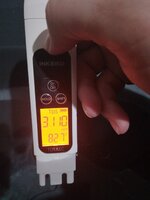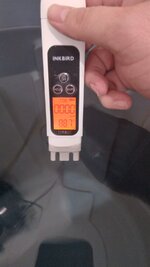Team Turtle
I'm bad at failing so I keep trying
Staff member
Moderator
Board Member
Supporting Member
Build Thread Contributor
So I use two, 44 gallon brute trash cans for my rodi water storage...fill both with fresh water and mix my salt in one when doing water changes on my 160. After that water change i rinse the can, let it dry and the next day fill back up with fresh water. The water then sits for 2-3 weeks until i mix salt water again...the other can get's used throughout the days for my top off and i fill as needed. Well i got a new tds pen from inkbird for my fresh water planted tanks and decided to double check the tds meter on my rodi unit. Filter says 0. Pen says 0 in can that gets used regularly. Test the second can that has been sitting for 3 weeks now and it says 3110. I test again...3110. Other can 0..test other fish tanks and they range between 113 and 150..again, fresh water planted tanks. Back to brute can...3110. Question would be. Is the trash can leaching something into the water? My tds before the rodi averages 550 so at a loss here. I could rotate which one i use but if it's leaching something I'm not using it anymore. Will note i bought both cans at the same time from home depot
Attachments
Last edited:














